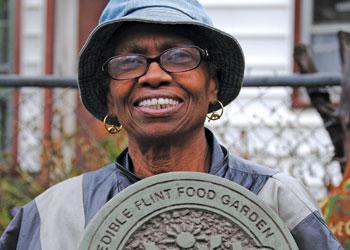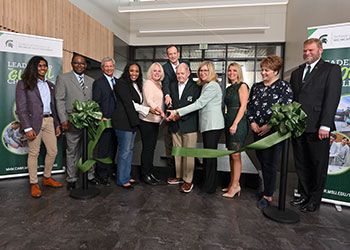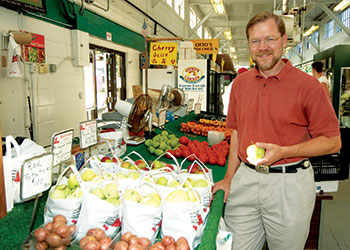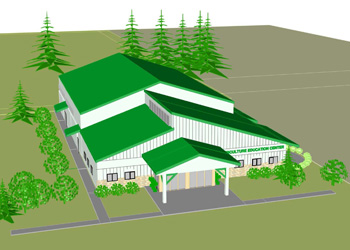Edible Flint – Engaging a Community in Local, Healthy Food Programs
Over the past six years, the Ruth Mott Foundation has made grants totaling more than $500,000 to support MSUE’s urban agriculture/ local food systems programs.
February 26, 2015
In partnership with the Ruth Mott Foundation, Michigan State University Extension (MSUE) directly supports the local food systems movement in Flint and Genesee County. Community Food Systems Educator Teresa McLean is MSUE’s point of contact for the edible flint network and the broader Genesee Food Systems group.
Over the past six years, the Ruth Mott Foundation has made grants totaling more than $500,000 to support MSUE’s urban agriculture/local food systems programs that address the Foundation’s priorities which are:
• healthier and more active lifestyles.
• Improved public awareness of the benefits of locally grown
fruits and vegetables through urban gardening/farming.
• Promoting season extending farming techniques and
community supported agriculture programs, supporting a
healthy food system.
“The MSU Extension-Genesee team is extremely competent, passionate and connected to statewide resources, research, policy initiatives and the conventional farming industry,” said Handy Lindsey Jr., president of the Ruth Mott Foundation.
“The Ruth Mott Foundation’s healthy food system strategy recognizes that education, technical assistance for food producers, information sharing among all players in the local food system, and collaborative partnerships are required to achieve the goal of increasing access to and the consumption of healthy and affordable food for Flint and Genesee County residents. There is no better organization to do this than MSUE.”
edible flint is a network of residents, nonprofit organizations, government representatives, health institutions, educators, and advocates for social change who work together in the interest of a common mission: supporting Flint/Genesee residents in growing and accessing healthy food in order to reconnect with the land and each other. With this mission in mind, edible flint has divided its efforts among five different work groups (Access & Education, Garden Starters, Food Garden Tour, Grower’s Co-operative & Organizational), each self-organized to address the specific issues and opportunities in our local food system. Throughout the year, edible flint’s work groups envision, plan and implement these efforts addressing individual and community needs for healthy food access, creative and productive use of vacant land, knowledge and resilience.
The City of Flint and Genesee County are communities in significant need of activity that can support economic opportunities for low-income individuals, access to healthy foods, and innovative models and ideas around land use and community vitality. With high levels of obesity, limited access to healthy food, and 12,000 available vacant lots in Flint, the launching point for all local food efforts is improving access to healthy food, land, knowledge, and resources. Urban agriculture, community gardening and nutrition education as a comprehensive approach to building community, improving public health, maintaining vacant and abandoned land, working with disenfranchised youth and empowering residents to make a difference in their neighborhoods is one of this community’s solutions.
Through involvement in statewide initiatives and programs McLean’s role has been to link the local food movement to statewide good food (healthy, green, fair, affordable) initiatives, and is strategically positioned to connect statewide resources to local efforts. The MSU Center for Regional Food Systems and its MSU Student Organic Farm provide research and support for urban gardening/farming work in Flint. The Student Organic Farm is a leader in developing season-extension food production techniques (passive solar greenhouses called hoophouses) and has provided local hoophouse growers with regular hands-on technical expertise with support from the Ruth Mott Foundation for several years. McLean’s role as community food systems educator is integral, engaging community partners, coordinating communications, delivering educational programming and technical assistance, and supervising two edible flint staff dedicated to the edible flint mission. This staff is funded primarily through the Ruth Mott Foundation, and the multi-year USDA Food Access in Michigan grant.




